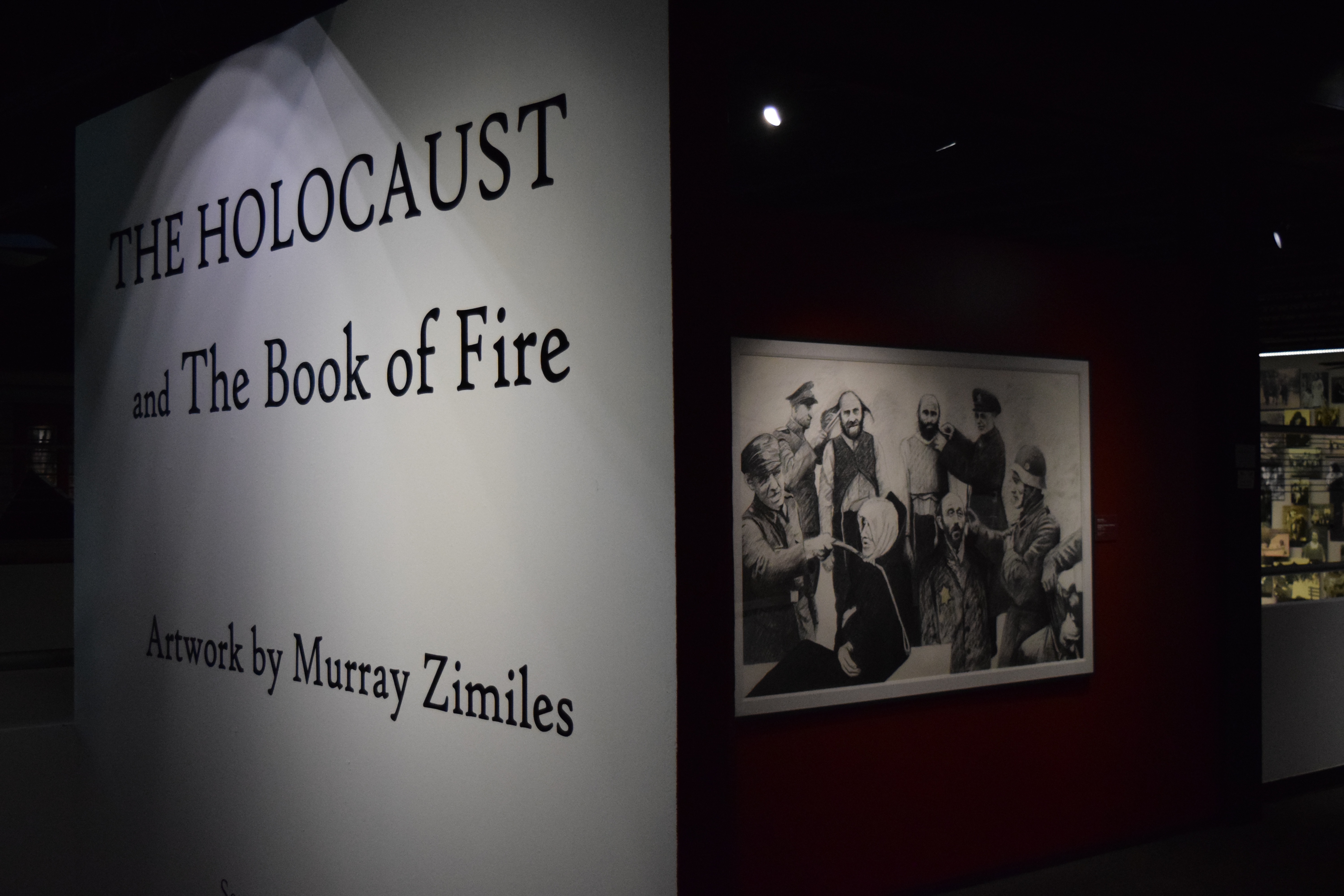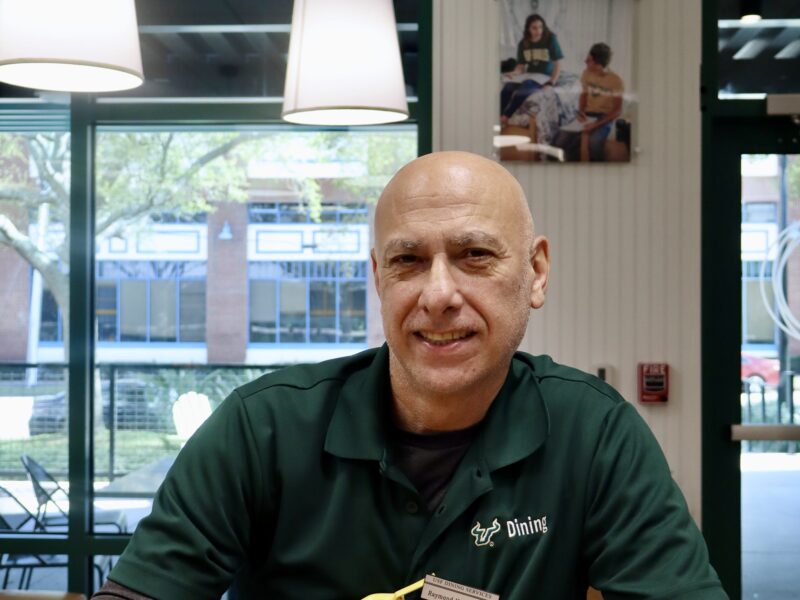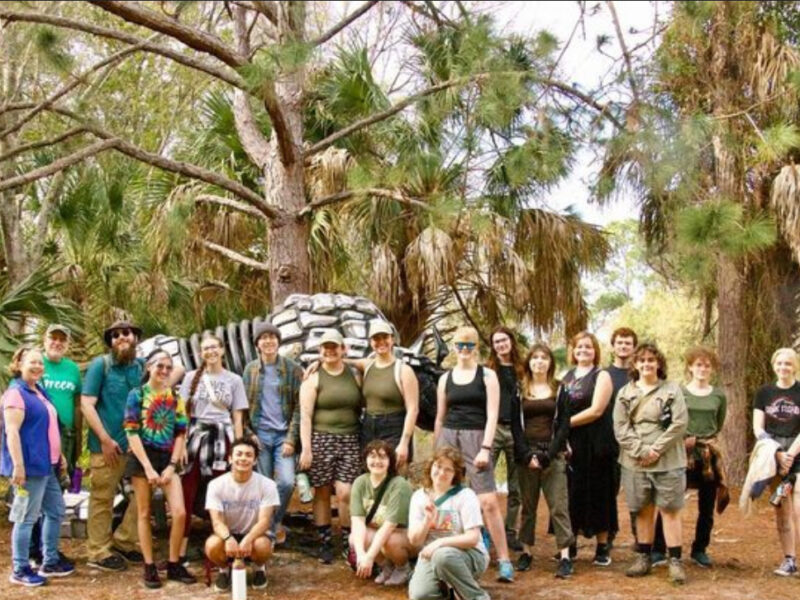By Sara McDonald
Since working at The Florida Holocaust Museum, I’ve witnessed an extraordinary amount of strength and resilience from followers of the Jewish faith and Holocaust survivors.
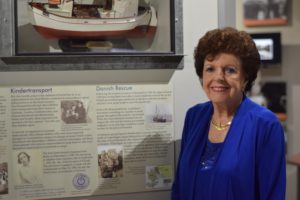
When the Nazi flag flew high and proud in the Charlottesville rally, I was out of town but my heart broke. All I could think about were the survivors who volunteer at the museum frequently in the hope of a future where prejudice and genocide weren’t praised. I hope they wouldn’t give up on their dream of a better today.
I knew the community needed to hear and learn from these survivors. Every survivor I have met has the iron clad resolution to teach the world to learn from past mistakes.
Plus there was no one better to combat a resurgence of Nazism than the people who stood up and braved them before.
Tell me about yourself. What was life like before the war?
- RL: My name is Ruth Lebowitz (nee Spingarn). I was born in 1933 in Breslau, Germany. Life was great. My father owned a very large business and we had a very nice life. We had a large family with lots of aunts and uncles and cousins, and we would get together a lot. Hitler came to power the year I was born, 1933, and from then life changed. All Jewish babies had to be identified on their birth certificates with their middle name as “Sarah” for girls and “Israel” for boys, so my name is Ruth Sarah.
- LS: My name is Lisl Schick. I was born in Vienna, Austria on Dec. 20, 1927. I went to school and [went on] vacations and had a good life before the war. One of my best memories was my mother came home and she was carrying a little blue bundle and she said this is your brother and you’re going to help me take care of him. Little did she know how much I would take care of him. His name was Walter Porges and he was 4 years younger than me.
- EH: My name is Edward Herman. I was born Dec. 6, 1931, which was Hanukkah. I am from Warsaw, Poland but we moved to Katowice. Life before the war was wonderful. We had a car which was very rare at the time. We had a maid and would take vacations. When my grandfather died, the fire department marched with my family for the funeral. I was very close to my father. My mother was stunning.
How did it feel to see the Nazis marching in your streets?
- RL: They were soldiers. I didn’t know better I guess. I knew to stay out of their way.
- LS: I was frightened. Hitler marched into a welcoming crowd. The very next day the Nazi flag and emblem was everywhere. They were all celebrating and dancing in the streets. I was frightened and knew it wasn’t going to be good and it did go from bad to worse. That’s when Kristallnacht happened. The Nazis broke into every synagogue and temple. They took our holy books and trampled and threw them in the streets. They smashed and looted the stores and burned synagogues. When my father went to walk us to school the next morning, there was glass everywhere, but the scariest thing I saw was a line of Jewish men and they were on their hands and knees. They had little scrub brushes in their hands and standing over them was the SS (Schutzstaffel, which is German for “Protective Echelon”. The SS were so-called “political soldiers” of the Nazi Party.) with whips. If these poor Jewish men didn’t do whatever [they asked]fast enough, they cracked the whip. Standing around them were bystanders laughing and grinning. This was their morning entertainment.
- EH: I saw them in Warsaw first when it got bombarded day after day, buildings falling right before me. But the Nazis would march in for silver and money. I was beaten by a Polish police man for no reason at all. When I would hear that a truck was coming, I would try to hide and run, but it was precautionary. I am strong. I wasn’t scared of them.
What was your day to day life like during World War II?
- RL: We left a week before Germany invaded Poland. We left in September 1939. We were extremely lucky because after that Jews were not leaving Germany. Moving was very hard for my father to start over. My mother died in Germany before we left. She was ill. She had gotten pneumonia and medical care was not good for us because we were Jewish. She had just kept getting worse and then she died when I was 4-years-old.
- LS: My father lost his job because he was Jewish so I had to move in with my maternal grandparents. I was very close to my maternal grandmother so I thought it was going to be fun since she spoiled me. But it was just tense. Everyone was so scared. We lost our citizenship. Walter and I left on the Kindertransport which rescued 10,000 children but only 1,000 saw their parents again (The humanitarian effort relocated children 17 and under from Nazi Germany and other surrounding countries to the U.K. in the months before the start of World War II). Out of the 10,000 children, everyone had a different experience. Some were treated fabulously well. Some were abused. Walter and I fell in between.
- EH: Hungry. I was always so hungry. The bread ration had sawdust in it. Children would beg for food. I had many close calls. In January 1942, they decided on the “Final Solution” (the Nazi plan to exterminate the Jewish people) . I was always on the run. My mother could sometimes smuggle us some food from outside the ghetto. But it was not much. There were dead bodies in the streets.
How did you survive?
- RL: My father had a friend who was a government official and he notified my father that he had seen a Gestapo list (Nazi Germany’s political police that gathered Jews across Europe to deport them to the concentration camps) and that my father’s name was on it. He told him “You better leave now.” so he did. He was able to be smuggled out of Germany into Holland and he was able to buy forged papers, and that’s how he came to the United States. He was then able to send for my siblings and me.
- LS: A few weeks after Kristallnacht (a string of violent anti-Jewish attacks that happened across Germany on Nov. 9 and 10, 1938), my parents came to me and said we have a chance to get you on a kindertransport that will take you to England. And we will try to follow as soon as possible. My mother asked if I would consider that but told me I had to promise to take care of Walter. I said yes. I just knew I had to get out. We were put on the kindertransport in April 1939.
- EH: We had a Christian maid who, at the beginning of the war, gave my mother her birth certificate so no one would question her and because she was blonde and so beautiful, no one really did. She decided it was time for me to get smuggled out of the ghetto so that I could survive. She did it at the right time because a few months later, they started bringing the Jews from the Warsaw ghetto to Treblinka for the “Final Solution.” I went to Nowy Wisnicz and then once there, we had gotten notice that Jews had to assemble in the square. My mother heard of this and paid a prison guard to hide me in the attic…I was always on the run.
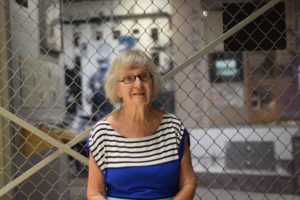
How did events leading up to Charlottesville make you feel and did it remind you of events leading up to World War II?
- RL: Oh definitely. In the museum, there’s photos of these rallies and marches. And now in the newspaper, there’s these photos of the marchers and they have the torches and the Nazi flag, which is a symbol of such hatred and evil. It’s just awful to think that these are Americans and you wonder if they really know what they are doing and who they are aligning with. Like the KKK (Ku Klux Klan) which was also so frightening. America was such a haven and this is where things like this aren’t supposed to happen. This is where people go for freedom and opportunities no matter what your religion or your race, and that it (events like the Charlottesville rally) is going on here is quite scary.
- LS: I was very, very upset. One of my daughters graduated from UVA (University of Virginia), which is a very, very fine school. We were in Charlottesville many times. It is a lovely, tranquil town and the campus is the loveliest campus I have ever seen. When this happened my daughter called me in tears. She said “Mom, can you believe this happened in the place I loved so much?” What really upset me was it was like déjà vu for me. I was watching these people get shot and pushed and of course one person gets killed and I’m watching these men that look like Nazis and they are carrying their flags.
- EH: Disturbed. Especially by the reactions. Nazis are not new and the KKK likes the Nazi philosophy. The stage was set. What I don’t like the most was the reaction afterwards, especially by the sympathizers. It is just disturbing. It is frightening that these people [Neo-Nazis and the KKK] still believes in these ideas that are rooted in nothing but hatred. Unfortunately there is not a few (people). And what are their real reasons? Economic?
How did it make you feel seeing Nazis marching again?
- RL: Back then many people said “Oh this will go away. This will pass. It can not continue” but it did and there were people who said “It can never happen in the United States” but it just did. So the question is what do we do about it now?
- LS: It made me feel like the museum is more important than ever. Education needs to be important to our children. (Adolf) Hitler took away material things, but no one could ever take away our education. The same for now. That and to know it’s not okay to bully one another. When I saw it on my television, I was terribly upset. I had to turn it off immediately because I almost got physically ill. At first I couldn’t believe it, but then I turned it off because I have been there and done that, and not again.
- EH: I couldn’t sleep at all. It brought up so many hurtful memories from the past. My daughter and son were very upset as well. I mean every Jewish American is upset.
Do you think our communities can be fixed?
- RL: We sure can work on it. The Holocaust Museum here is a fantastic venue for doing things like that. The mission is to teach tolerance and diversity of all people and when I look at some of those angry faces on television of these guys that have gotten their Nazi flags and torches, I just wonder what they actually even know about what happen and how really horrible the people were who were waving those same flags they are waving today.
- LS: Maybe, if we educate our children and set a better tone. We need to impress on people not to bully in the first place. But also, if you see something that you know is wrong, do something about it. Tell a teacher, parent, friend or anyone who can help so that you can stop it. Do not be a bystander.
- EH: Well, we need to get Congress on board. Republicans and Democrats are more concerned with winning elections than they actually are with the country.
If you could teach our upcoming generation one thing, what would it be?
- RL: There is no such thing as a master race. One people is not superior to others. No one has the right to annihilate or enslave another.
- LS: Education. Appreciate your teachers. I lecture in memory of my brother. I hope the message of “never again” isn’t lost but it is being threatened and in jeopardy. It can start with small things but it will escalate. That’s how the whole rise of Nazism happened. Gradually.
- EH: Stand up against hatred. Do not be a bystander. Be an upstander and stand. We need to work together and respect one another. If something is going on that is wrong, we need to deal with it and intervene. Always do something about it if it is wrong.
Hitler was quoted saying “hatred, burning hatred— this is what we want to pour into the souls of our millions of fellow Germans, until the flame of rage [is] ignited in Germany and avenges the corrupters of our nation.” How do you feel about that statement, and if he was here, what would you say to him in response?
- RL: I would tell him that he completely failed in what he tried to achieve. “Deutschland Uber Allies” – and that the world had moved in a completely opposite direction. Although there are unfortunately still people who are openly racist, as evidenced by the white supremacists, the neo-Nazis and the KKK at Charlottesville, their agendas are eviscerated by the comparison to him as the epitome of hatred and evil by the rejection of a civilized society.
- LS: It’s a horrible statement and I would say the exact opposite. Anne Frank said despite everything people are good at heart.She was an idealist true, but I believe we are born good, and that we have to nurture the positive and not introduce the negative.
- EH: Hatred is a poison. The worst thing you can do to humanity is poison them.
What do you want to say to us in response to Charlottesville and to us as a nation?
- RL: Go to the museum. Know the past and what really happened. Get educated and stay above the hatred. Don’t give into it.
- LS: Education. I keep saying it but that’s number one. Respect and compensate teachers much higher than we do because they are one of the most important people in our lives. Lack of education has led us here. We need to raise the bar to a higher level in creating and teaching people. We must continue to learn from the past and to strengthen our education.
- EH: A quote by Santayana sums it up best which is “Those who do not remember the past are condemned to repeat it.” Do not ignore history. Learn from it.

